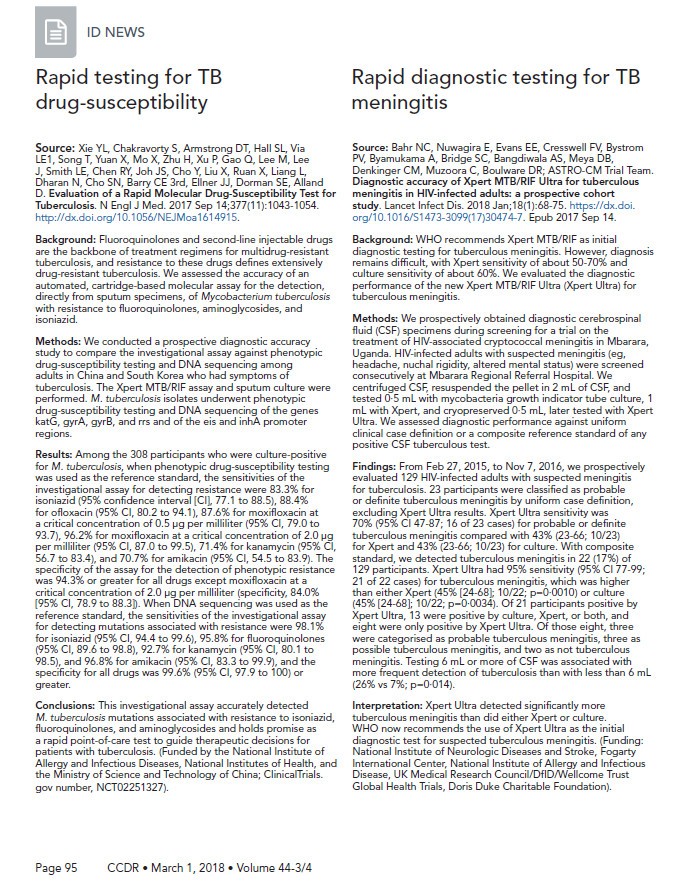TB drug-susceptibility

 Download this article as a PDF
Download this article as a PDF Published by: The Public Health Agency of Canada
Issue: Volume 44-3/4: Can we eliminate tuberculosis?
Date published: March 1, 2018
ISSN: 1481-8531
Submit a manuscript
About CCDR
Browse
Volume 44-3/4, March 1, 2018: Can we eliminate tuberculosis?
ID News
Rapid testing for TB drug-susceptibility
Source: Xie YL, Chakravorty S, Armstrong DT, Hall SL, Via LE1, Song T, Yuan X, Mo X, Zhu H, Xu P, Gao Q, Lee M, Lee J, Smith LE, Chen RY, Joh JS, Cho Y, Liu X, Ruan X, Liang L, Dharan N, Cho SN, Barry CE 3rd, Ellner JJ, Dorman SE, Alland D. Evaluation of a Rapid Molecular Drug-Susceptibility Test for Tuberculosis. N Engl J Med. 2017 Sep 14;377(11):1043-1054.
Background: Fluoroquinolones and second-line injectable drugs are the backbone of treatment regimens for multidrug-resistant tuberculosis, and resistance to these drugs defines extensively drug-resistant tuberculosis. We assessed the accuracy of an automated, cartridge-based molecular assay for the detection, directly from sputum specimens, of Mycobacterium tuberculosis with resistance to fluoroquinolones, aminoglycosides, and isoniazid.
Methods: We conducted a prospective diagnostic accuracy study to compare the investigational assay against phenotypic drug-susceptibility testing and DNA sequencing among adults in China and South Korea who had symptoms of tuberculosis. The Xpert MTB/RIF assay and sputum culture were performed. M. tuberculosis isolates underwent phenotypic drug-susceptibility testing and DNA sequencing of the genes katG, gyrA, gyrB, and rrs and of the eis and inhA promoter regions.
Results: Among the 308 participants who were culture-positive for M. tuberculosis, when phenotypic drug-susceptibility testing was used as the reference standard, the sensitivities of the investigational assay for detecting resistance were 83.3% for isoniazid (95% confidence interval [CI], 77.1 to 88.5), 88.4% for ofloxacin (95% CI, 80.2 to 94.1), 87.6% for moxifloxacin at a critical concentration of 0.5 μg per milliliter (95% CI, 79.0 to 93.7), 96.2% for moxifloxacin at a critical concentration of 2.0 μg per milliliter (95% CI, 87.0 to 99.5), 71.4% for kanamycin (95% CI, 56.7 to 83.4), and 70.7% for amikacin (95% CI, 54.5 to 83.9). The specificity of the assay for the detection of phenotypic resistance was 94.3% or greater for all drugs except moxifloxacin at a critical concentration of 2.0 μg per milliliter (specificity, 84.0% [95% CI, 78.9 to 88.3]). When DNA sequencing was used as the reference standard, the sensitivities of the investigational assay for detecting mutations associated with resistance were 98.1% for isoniazid (95% CI, 94.4 to 99.6), 95.8% for fluoroquinolones (95% CI, 89.6 to 98.8), 92.7% for kanamycin (95% CI, 80.1 to 98.5), and 96.8% for amikacin (95% CI, 83.3 to 99.9), and the specificity for all drugs was 99.6% (95% CI, 97.9 to 100) or greater.
Conclusions: This investigational assay accurately detected M. tuberculosis mutations associated with resistance to isoniazid, fluoroquinolones, and aminoglycosides and holds promise as a rapid point-of-care test to guide therapeutic decisions for patients with tuberculosis. (Funded by the National Institute of Allergy and Infectious Diseases, National Institutes of Health, and the Ministry of Science and Technology of China; ClinicalTrials.gov number, NCT02251327).
Rapid diagnostic testing for TB meningitis
Source: Bahr NC, Nuwagira E, Evans EE, Cresswell FV, Bystrom PV, Byamukama A, Bridge SC, Bangdiwala AS, Meya DB, Denkinger CM, Muzoora C, Boulware DR; ASTRO-CM Trial Team. Diagnostic accuracy of Xpert MTB/RIF Ultra for tuberculous meningitis in HIV-infected adults: a prospective cohort study. Lancet Infect Dis. 2018 Jan;18(1):68-75. Epub 2017 Sep 14.
Background: WHO recommends Xpert MTB/RIF as initial diagnostic testing for tuberculous meningitis. However, diagnosis remains difficult, with Xpert sensitivity of about 50-70% and culture sensitivity of about 60%. We evaluated the diagnostic performance of the new Xpert MTB/RIF Ultra (Xpert Ultra) for tuberculous meningitis.
Methods: We prospectively obtained diagnostic cerebrospinal fluid (CSF) specimens during screening for a trial on the treatment of HIV-associated cryptococcal meningitis in Mbarara, Uganda. HIV-infected adults with suspected meningitis (eg, headache, nuchal rigidity, altered mental status) were screened consecutively at Mbarara Regional Referral Hospital. We centrifuged CSF, resuspended the pellet in 2 mL of CSF, and tested 0·5 mL with mycobacteria growth indicator tube culture, 1 mL with Xpert, and cryopreserved 0·5 mL, later tested with Xpert Ultra. We assessed diagnostic performance against uniform clinical case definition or a composite reference standard of any positive CSF tuberculous test.
Findings: From Feb 27, 2015, to Nov 7, 2016, we prospectively evaluated 129 HIV-infected adults with suspected meningitis for tuberculosis. 23 participants were classified as probable or definite tuberculous meningitis by uniform case definition, excluding Xpert Ultra results. Xpert Ultra sensitivity was 70% (95% CI 47-87; 16 of 23 cases) for probable or definite tuberculous meningitis compared with 43% (23-66; 10/23) for Xpert and 43% (23-66; 10/23) for culture. With composite standard, we detected tuberculous meningitis in 22 (17%) of 129 participants. Xpert Ultra had 95% sensitivity (95% CI 77-99; 21 of 22 cases) for tuberculous meningitis, which was higher than either Xpert (45% [24-68]; 10/22; p=0·0010) or culture (45% [24-68]; 10/22; p=0·0034). Of 21 participants positive by Xpert Ultra, 13 were positive by culture, Xpert, or both, and eight were only positive by Xpert Ultra. Of those eight, three were categorised as probable tuberculous meningitis, three as possible tuberculous meningitis, and two as not tuberculous meningitis. Testing 6 mL or more of CSF was associated with more frequent detection of tuberculosis than with less than 6 mL (26% vs 7%; p=0·014).
Interpretation: Xpert Ultra detected significantly more tuberculous meningitis than did either Xpert or culture. WHO now recommends the use of Xpert Ultra as the initial diagnostic test for suspected tuberculous meningitis. (Funding: National Institute of Neurologic Diseases and Stroke, Fogarty International Center, National Institute of Allergy and Infectious Disease, UK Medical Research Council/DfID/Wellcome Trust Global Health Trials, Doris Duke Charitable Foundation.)
Page details
- Date modified: